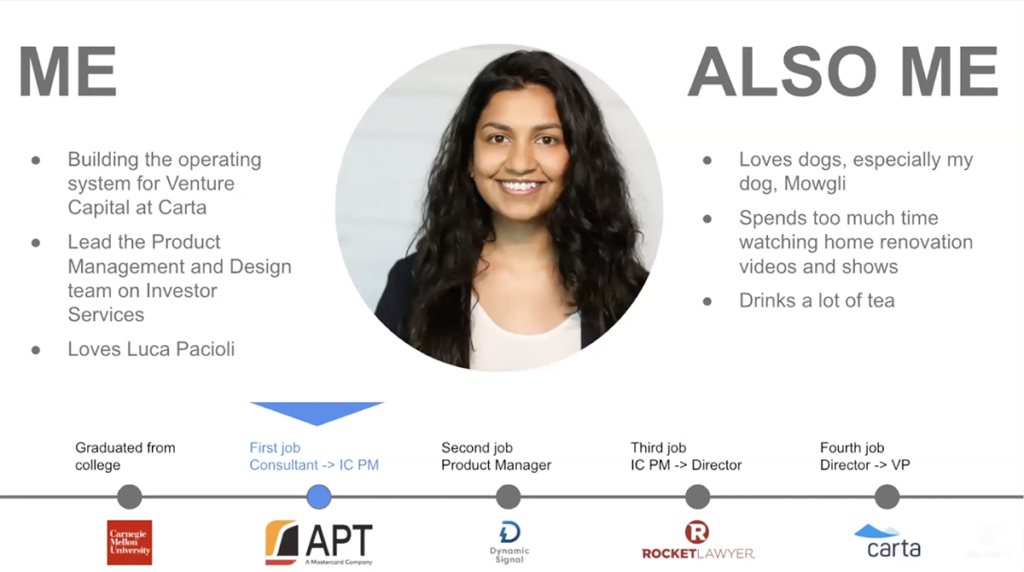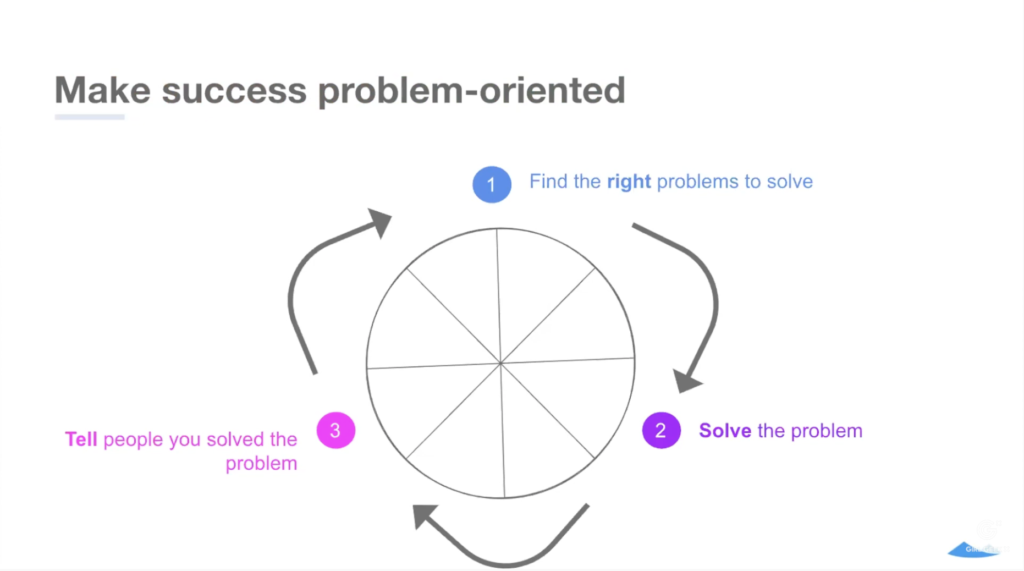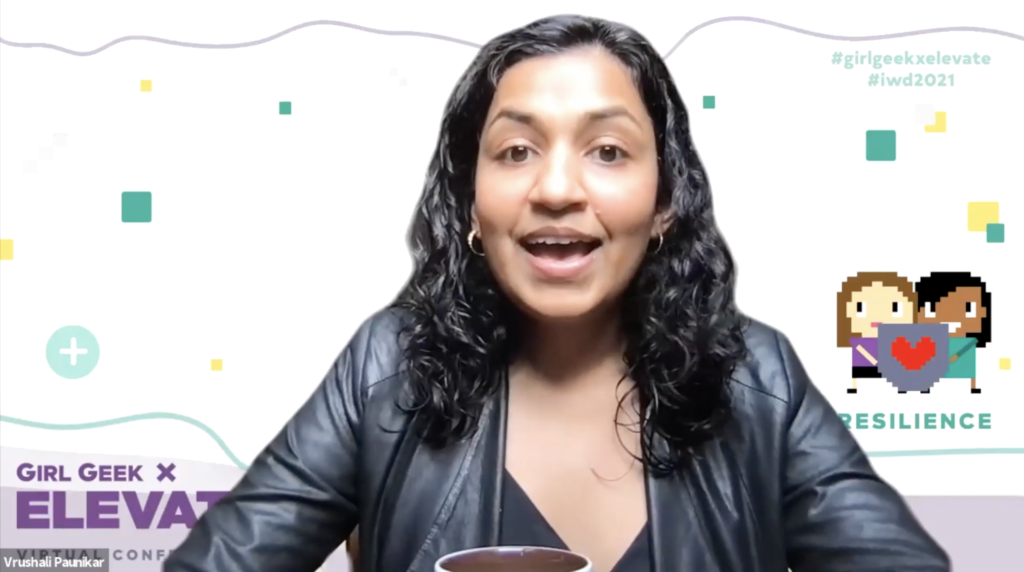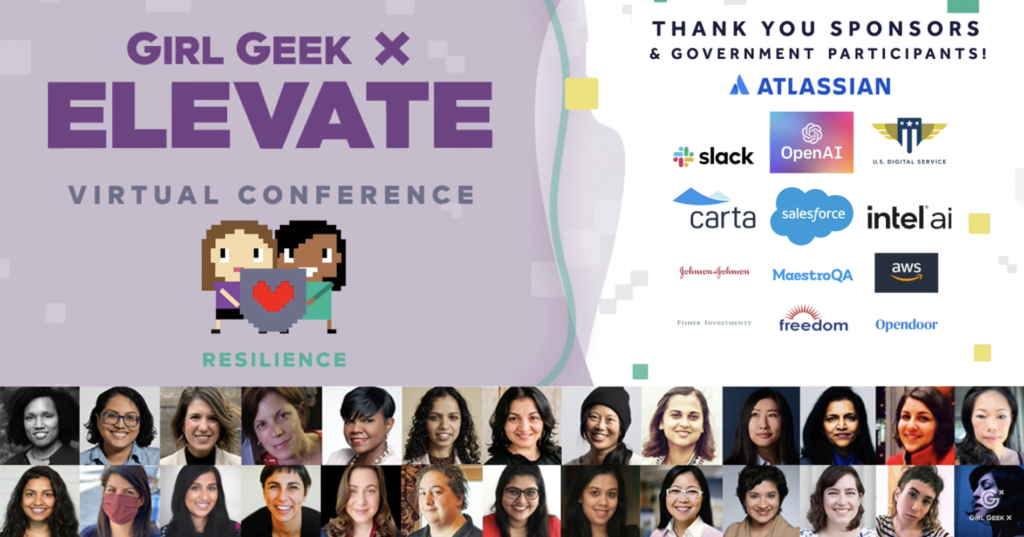VIDEO
Vrushali Paunikar (VP of Product at Carta) talks candidly about her own career journey and why a problem-oriented mindset has been such an important tenet of her leadership.
Like what you see here? Our mission-aligned Girl Geek X partners are hiring!
- See open jobs at Carta and check out open jobs at our trusted partner companies.
- Watch all Elevate 2021 conference video replays!
- Does your company want to sponsor a Girl Geek Dinner? Talk to us!
Transcript
Angie Chang: Our next speaker is Vrushali, who is a VP of product at Carta. She’s building the operating system for venture capitalists. She previously led product at Rocket Lawyer, and she’s passionate about making the world more equitable.
Vrushali Paunikar: Thanks, Angie. All right, Girl Geeks, to start off I have some questions for all of you. How do you find and nurture the best product managers? How do you stand out when you feel like you’re being overlooked or undervalued? How do you thrive in a political environment without losing your sense of self? Fellow leaders, I imagine these are all questions you’ve grappled with. I know I certainly did, and that’s what I want to talk to you about today.
Vrushali Paunikar: All right, so I’m Vrushali Pauniker and I lead the investor services product team here at Carta. My answer to these questions is simple. Focus on solving problems. I will share with you three stories of how this approach has helped me navigate a career into product management and scale to vice president. I will also talk to you about how these experiences have shaped how I think about building teams today.
Vrushali Paunikar: All right, the first story is about how I got into product management. When I graduated from college, I did what a lot of business majors do who don’t know what to do with their lives. I became a strategy consultant. I joined a boutique practice that was developing its own software. As a consultant, I worked on complex analyses to help drive insights for our clients. As a power user of the software, I had a lot of opinions about the improvements that could make my life better. I signed up to be a part-time product analyst, helping our engineering team scope and build features.
Vrushali Paunikar: Many of the features I was assigned were problems I had been solving for our customers. I would spend an hour of every morning working with our engineering team, where I would share my SQL queries and the outputs that we presented to customers. We would talk through user flows, brainstorm the user experience. We would talk about the math and the validation strategies.
Vrushali Paunikar: And then after that hour, I would switch back to my consulting work. This quickly became my favorite hour of the day. It also changed how I thought about my day job. Every predictable and deterministic task was one that could be automated through software. Every complex analytics flow, I started imagining the software workflow that would streamline it.

Vrushali Paunikar: I became obsessed about solving more problems for more customers through software. I was becoming what Jeff Lawson from his 2013 unSEXY Conference talk would call a software person, someone who solves problems with magnetic particles.
Vrushali Paunikar: Two years later, when the firm decided to start its own full-time product management team, I was asked to be one of its seed members. It was this obsession of connecting customer problems to software, and the ability to execute, that made me a clear choice for this team.
Vrushali Paunikar: I had found my calling. So think about the Vrushalis lurking in your org. How might you spot them? How might you create opportunities for them? I’m a big believer in creating internal mobility into product management. Create the opportunity that was created for me. Not only is it my way of paying it forward, it’s also good for business.
Vrushali Paunikar: If you’ve been a hiring manager for product roles, you know that the competition for the best talent is steep. With a little investment, you can nurture the best PMs of tomorrow. By hiring product managers from within your company, you get the advantage of asymmetric information. You can look for the people who demonstrate the skills that lend themselves to a future in product management, the systems thinkers, the structured communicators, the resourceful, and the creative problem solvers.
Vrushali Paunikar: You can also hire from areas of the business where domain knowledge is especially valuable to a particular role in product. Over 50% of my team today came into product management from another role at Carta. Many of them came from services teams and have a deep knowledge of our customer and the venture industry.
Vrushali Paunikar: All right, my second story is one about Rocket Lawyer. So I joined Rocket Lawyer to help democratize the access to justice. About a year into the job, our leadership gathered all the product managers in a room to do our quarterly planning. They had listed all of the R&D priorities, in order, on the whiteboard. And they started assigning each priority to a product manager.
Vrushali Paunikar: Number one, Stan. Number two, Stephanie, Vanessa, Jeff. I held my breath as each name got called out that wasn’t mine. Sure enough, my name got called out last. It was a project to redesign our logged in dashboard. What made matters worse was that it was a project that had had a lot of starts and stops. PMs before me had attempted to tackle this project unsuccessfully. Many of them were no longer at the company.
Vrushali Paunikar: After some private sulking, I decided to embrace the problem. I focused on delivering value to the user, the person who needs legal help. I had a small team, as a function of being the lowest priority project, of just one engineer and one designer. With this team, we decided to take a different approach than our predecessors. We skipped the months of research and planning. Instead, we took a rapid prototyping approach to validate our hypotheses and build towards a minimum lovable product.
Vrushali Paunikar: We learned to do a lot with a little. More importantly, I learned how to get people excited about solving problems with me. My small squad felt a little rebellious, a little bad, but we were the good guys fighting for the user. Slowly, we were drumming up excitement at the company. Our experience was sexy. We were able to show progress instead of just talking about it.
Vrushali Paunikar: Within two months, we launched. We measured the impact and engagement. It was up. After resolving some early performance issues, our experience also improved trial conversion rate. That was unexpected. That project put me on the map. It was a win that no one was counting on. I became known as the product manager who could solve any problem you threw at her.
Vrushali Paunikar: It also won me the right to ask for the projects that I wanted. This credibility and growing track record of solving problems helped me go from an IC to a director of product management at Rocket Lawyer. You don’t have to be put on the most important projects at work. Be a steward to the problem and the user. It will not go unnoticed. Vrushali Paunikar: Today, as a manager of several PM teams, I invest in the teams that show a track record of solving problems. Carta’s CEO, Henry Ward, talks a lot about progress, not activity. “Don’t fall into the activity trap,” he says, “Where people take on a lot, but make little progress on any front.”
Vrushali Paunikar: Oftentimes a team or a manager will collect a bunch of problems and then ask for resources to go solve all of these problems. That’s counterproductive. The signal for investment are the teams that have already shown a high return on investment. For product managers, success is not just about shipping. It is about driving an impact. A person’s problem solving track record is also a big part of how we do performance reviews, promotions, and staffing conversations at Carta. We’re in the process of actually rolling out internal resumes, problem resumes, on an application called Confirm HR.
Vrushali Paunikar: All right, so the third story is of how I withstood the turmoil of a rapidly growing startup and flourished. In 2017, I started talking to a company called eShares. They were set out to fix the income inequality gap by creating more owners. Henry Ward, the CEO, spoke and wrote about building a special type of company driven by first principles.
Vrushali Paunikar: They were deliberate about the way they wanted to run their business. Their manifesto, called eShares 101, laid out the guiding principles for the company. They ranged from inspirational to kooky. I was in. By the time I joined the company, they rebranded to Carta, and our series C had closed. Never had I met a group of people who were so passionate about the problems they were solving. The company’s core principle of, “Always be helpful” was so prevalent. Everyone went out of their way to help me onboard. We would also recall other company principles like do the right thing, data models first, cage match everything, when we ran into day-to-day challenges.
Vrushali Paunikar: Nine months into the job, we closed our series D at an $800 million valuation. This is when things started getting chaotic. We were on the map, on the verge of unicorn status. We started hiring outside execs that told us and Henry to reform our kooky ways. At one point, we removed the eShares principles from the doors of our office conference rooms. Politics started seeping through the various cracks of our rocket ship.
Vrushali Paunikar: At times, it felt like perception mattered more than reality. I felt overwhelmed. I felt overlooked and undervalued. But there was one thing that no one could take away from me. It was the one thing I would hold on to tighter when I felt confused, lost, or sad. It was the ability to wake up every day and solve problems for our customers. I was at Carta to build a platform for venture capital. It would help me shape the future of the industry and its players. It would also help us create more owners.
Vrushali Paunikar: Luckily, this period at Carta did not last long. After a troubling year of execution, Henry took us back to the first principles approach that made us the special company that we were. He published a new version of the eShares 101, this time calling it the Carta identity traits and operating principles. “We are helpful, relentless, unconventional, and kind,” he told us. The atomic unit of Carta, the company, is a problem.
Vrushali Paunikar: He did an audit of the company’s best problem solvers and elevated them. Carta promoted me twice in a matter of months. I now get to play a big part in shaping the company, our culture, and our practices. You too can establish a problem oriented culture at your company. Safi Bahcall in his book, Moonshots, talks about how as an organization grows, employees are put in a position where they are deciding how to best use the units of time.
Vrushali Paunikar: Given an hour, is that hour best spent on one, solving problems, or two, networking and getting ahead? You always want the answer to be number one. That is the higher value activity for your company. Establishing problem oriented culture starts with attracting the right people.
Vrushali Paunikar: To that end, we found that traditional job descriptions just weren’t cutting it. They don’t tell people what problems they’d be solving. They don’t give people a sense of what it’s like to be at the company or work with a particular team. Data also shows that traditional job descriptions often filter out women and underrepresented minorities when they feel like they don’t meet all the criteria.
Vrushali Paunikar: So last year, along with our Chief People Officer and the person who is now our Chief Marketing Officer, worked together to roll out problem descriptions. Problem descriptions focus on problems, not qualifications. They represent the team and the company in an authentic way. And they also remove all language we know that filters out underrepresented minorities and women. For example, years of experience. Now we tend to hire candidates who are more focused on what problems they’d have the opportunity to solve at Carta versus what their title would be.
Vrushali Paunikar: All right, you also need to make success problem-oriented. When new hires join Carta, and I tell them about what it takes to succeed here, I tell them three simple things. Find the right problem to solve, solve that problem, and tell people you solved that problem. On step one, the emphasis is on, right. The right problem is important, urgent, and one that the company’s willing to trust you with.

Vrushali Paunikar: Too often, I see people run towards shiny objects. Instead, find the problems that need solving, but aren’t getting attention. Remember my experience at Rocket Lawyer where I wasn’t solving the sexiest problem, but still was able to make the most of it. If you’re new to the organization, it’s important to establish trust. You don’t want the first problem you take on to be large and ambiguous. If you fail, the company won’t know if your failure was due to bad execution or because the problem is hard. Plus, you’ll know very little about what it takes to get things done at the company.
Vrushali Paunikar: So start with small and well-defined and work your way up to hard and ambiguous, and the rate at which you make that climb will depend on your seniority. Sometimes you’re going to fail at solving problems. That’s okay. It’s part of the game. But if you’ve dug deep, formed a solid hypothesis, and executed well, a failure is going to be full of learning and it will help you improve your next hypothesis.
Vrushali Paunikar: Which takes me to step number two, execution matters. Always lead with the problem. Make sure that your solution hypothesis matches the problem. On the product team, we write starts with why briefs to explain the problem, the solution hypothesis, and what success might look like. Bring your stakeholders along on this journey with you. This is also the step where you master the craft. The better you get at solving these problems, the higher quality outputs you’re going to produce.
Vrushali Paunikar: Step three, share that you’ve solved the problem or what you learned by trying. This is important. I often see women shy away from this step, but you won’t win the right to solve bigger problems without it. At Carta, we have weekly show and tells where anyone at the company can share what they’ve been working on. It’s one of the best ways to get visibility at the company.
Vrushali Paunikar: If you’re a leader at your company, create forums where people can share their problem solving journeys. In addition to show and tell in my business unit, we have weekly one hour sessions called investor services, IS, got talent, where people across the business shared their problem solving journeys at critical stages, problem, definition, hypothesis, demo, and report back. This time, for me, is sacred.
Vrushali Paunikar: And this is the success flywheel at Carta. If you do one, two and three, you win the right to solve bigger and more complex problems. That is growth. I know there’s someone out there right now who’s saying, “Hey, I do all of these things and I’m not being recognized.” Have patience. It will pay off. And I’ll let you in on a little secret. When you reach the higher levels of your organization through problem solving, you’re better equipped to handle all of the curve balls thrown at you versus someone who got there by other means.
Vrushali Paunikar: So steadfast, problem solvers, go forth and change the world.
Sukrutha Bhadouria: I see a question from Christine. How do you balance the possibility that organization will change and people will move around?
Vrushali Paunikar: Okay, I’m going to answer that question the way I interpret it, which, one is, how do you balance the possibility that organizations do change? And especially at a rapidly growing startup, that’s going to happen. I actually just like to embrace that change and lean into it because it’s an opportunity to learn.

Vrushali Paunikar: And then people will move around. That is especially if you’re creating internal mobility, that’s a function of that. And I think it’s … I like to encourage people to move around and go forth and like follow their passions. And within my own team, I’ve had someone who was like in product and then decided they actually wanted to pursue a career in design. And I try to be supportive of people’s passions because one of the things about building problem-oriented teams, and again, going back to the Safi Bahcall sort of problem where if with a unit of time, is that time best spent on networking or problem solving?
Vrushali Paunikar: One of the things that’s really important about that is person, problem, fit. So you want the person’s skills to fit sort of what the value they’re able to produce on a particular type of problem. So I think you need to let people sort of explore their passions and where their skill sets are best suited.
Sukrutha Bhadouria: Yeah. Well, with that, let’s wrap. Thank you so much, Vrushali. That was really insightful. When you do get the chance to look at the chat, people have really been resonating with your talk.

Like what you see here? Our mission-aligned Girl Geek X partners are hiring!
- See open jobs at Carta and check out open jobs at our trusted partner companies.
- Watch all Elevate 2021 conference video replays!
- Does your company want to sponsor a Girl Geek Dinner? Talk to us!


